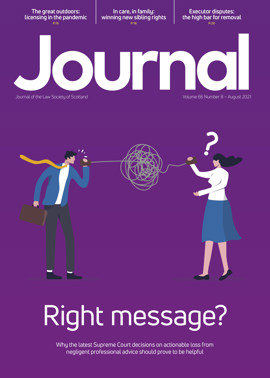Human rights: Reinforcing the right to be forgotten
The case of Hurbain v Belgium [2021] ECHR 544 is a recent decision which has reinforced the “right to be forgotten” in terms of article 8 of the European Convention on Human Rights.
Background
In 2004 Le Soir, one of Belgium’s leading French-language newspapers, published an article about a car accident that caused the death of two people and injured three others. This article was subsequently stored in Le Soir’s electronic archive. The article mentioned the full name of the driver, G, who was convicted in 2000. He served his sentence and was rehabilitated in 2006.
In 2012 G raised an action against Patrick Hurbain, as editor in chief of Le Soir, in order to anonymise the article. G argued that the article should be anonymised in terms of his right to respect for his private life under article 8. The domestic courts subsequently held that G was entitled to have the article anonymised. The Court of Appeal concluded that the most effective way to ensure respect for G’s private life, without disproportionately affecting Hurbain’s article 10 right to freedom of expression, would be to anonymise the article on Le Soir’s website by replacing G’s full name with the letter X.
Hurbain then lodged an application with the European Court of Human Rights (“ECtHR”) on the basis that the order for anonymisation was a breach of his right to freedom of expression under article 10.
Justified interference
When considering Hurbain’s application, the ECtHR did not dispute that the civil judgment against him constituted an interference with his rights under article 10. However, the ECtHR determined that the domestic courts were correct in concluding that the article should be anonymised.
In reaching this decision, the ECtHR took into account the Court of Appeal’s assertion that the electronic archiving of this article could give G a “virtual criminal record”, which could cause indefinite and serious harm to his reputation. The domestic courts also took into consideration the fact that G had already served his sentence and been rehabilitated. Further, as a significant period of time had passed since G’s conviction, a convicted offender may not have an interest in being confronted with his or her offence in order to ensure reintegration into society. The ECtHR agreed with the Court of Appeal’s assertion that the article was not newsworthy as it related to a historic event which concerned G, an individual who was not a public figure. As such, identifying him in the article did not enhance the public interest aspect.
Accordingly, by a majority of six to one the ECtHR chamber agreed with the domestic court’s decision to anonymise the article. When balancing G’s article 8 right to respect for his private life against Hurbain’s article 10 right to freedom of expression, it was determined that the article’s anonymisation was the most effective and proportionate measure in the circumstances. Further, this measure would not affect the text of the original article. As such, the ECtHR determined that the decision of the domestic courts was consistent with article 10, and specifically the interference with Hurbain’s article 10 rights was proportionate and in pursuance of the legitimate aim of ensuring G’s reputational protection. There was therefore no violation of Hurbain’s article 10 rights.
Comment
Although the ECtHR confirmed that its decision has not imposed an obligation on the media to check their archives on a systematic and permanent basis, it is evident that this case has strengthened the “right to be forgotten”. This decision has the potential to affect decisions of the Scottish courts which require to take judgments from the ECtHR into account. Publishers and the media ought to give careful consideration to this decision should they receive post-publication requests to remove names or identifying information from archived articles. Should a media outlet find itself in the same position as Hurbain, it appears that the courts will take into account striking the right balance between the rights of the individual and the rights of the media, and whether any interference with article 10 is proportionate and in pursuance of a legitimate aim. The extent to which the Scottish courts will take Hurbain into account is yet to be seen. However it is a case that is best not “forgotten” about...
Regulars
Features
Briefings
- Criminal court: Sentencing deconstructed
- Family: Litigation and lottery wins
- Human rights: Reinforcing the right to be forgotten
- Pensions: Plugging the LGPS exit credit hole
- Criminal law: The future of sexual offence trials
- Scottish Solicitors' Discipline Tribunal
- Property: Heat networks: the key to low-carbon heating?
- In-house: Power of the nudge






